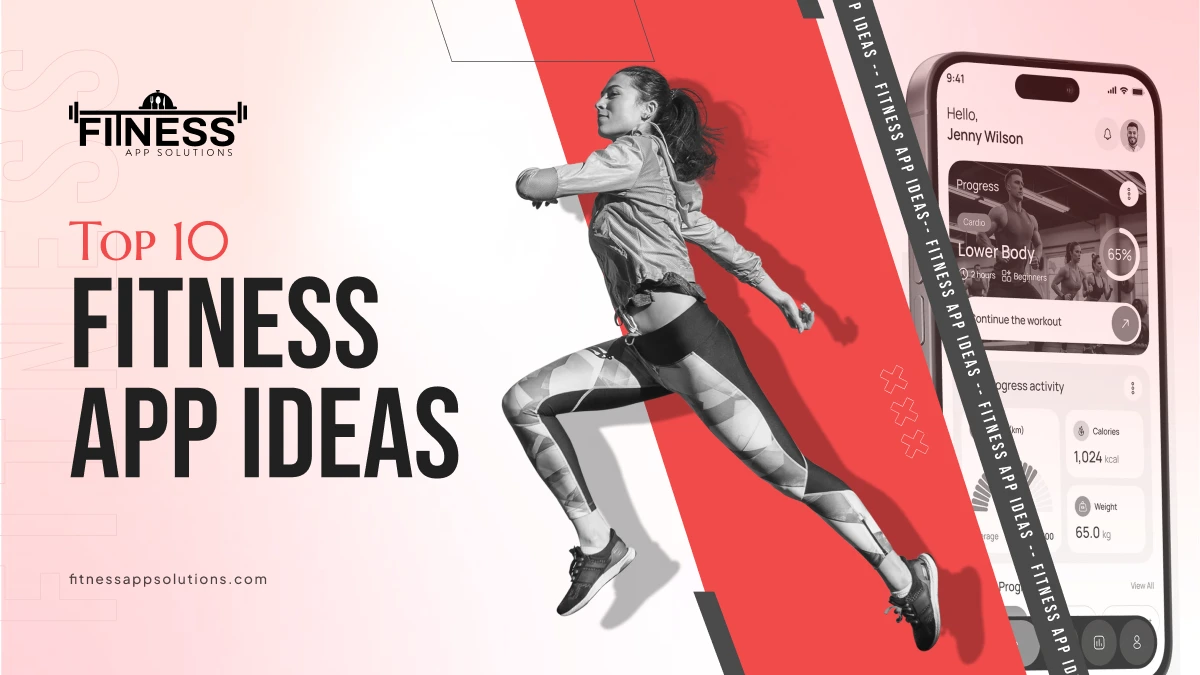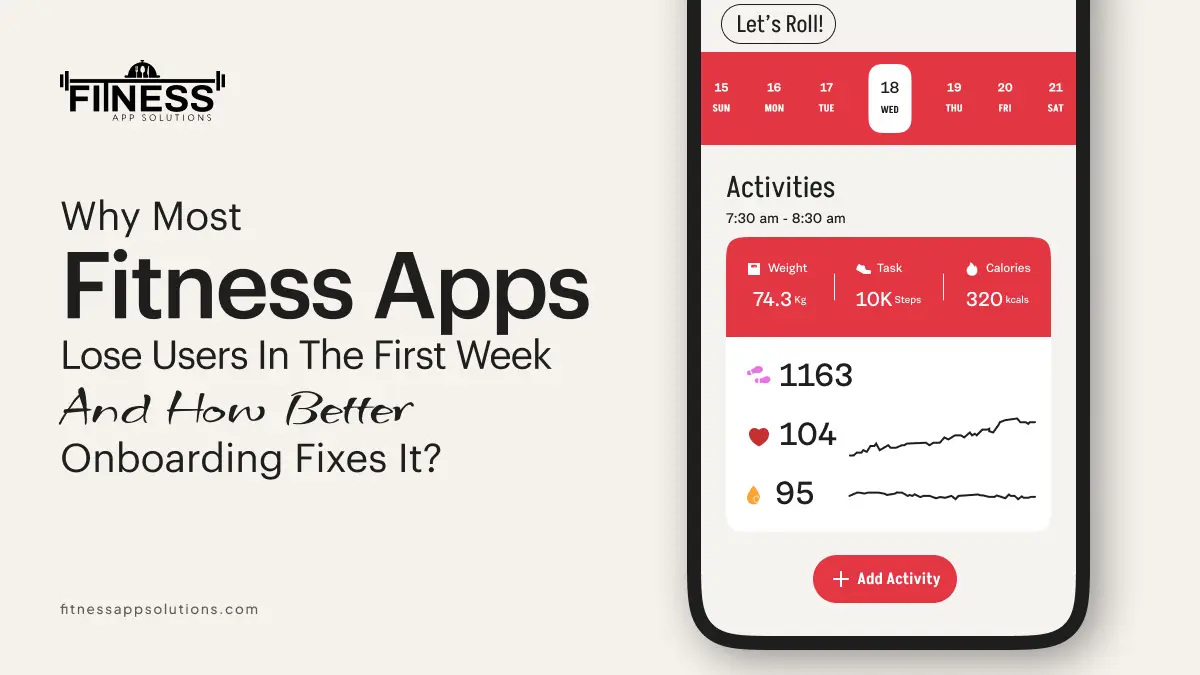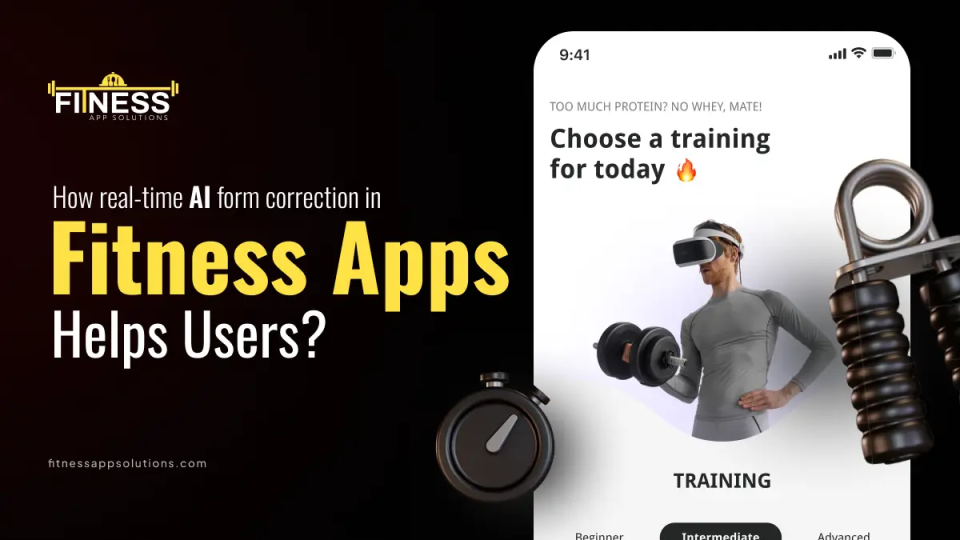As the technical world keeps evolving, fitness is changing the way we work out. In 2025, keeping updated with technology can be a game-changer if you are looking to develop a fitness app. Therefore, to help you, we have covered the Top 10 fitness app ideas that may boost your business and help you stay competitive.
Fitness Markets and Trends
The global fitness app market is estimated to reach $23.21billion by 2030, growing at a CAGR of 13.88% from 2025 to 2030. Also, the revenue in the fitness apps market is estimated to reach USD 12.12 billion in 2025. North America marked the last fitness market in 2024. (Source: grandviewresearch)
10 Fitness App ideas to consider

1.AI-powered Fitness Apps
Using AI functionalities, a fitness app can be developed on unique user data to generate customized workouts, adjust recovery strategies, and provide tailored AI to deliver customized interactions like virtual fitness coaches and intelligent chatbots. AI-driven video assistants can easily replace human trainers and automatically adjust workout sessions for engaging results.
Depending on the user’s fitness level, goals, and feedback, you can use AI to personalize workout plans. The App continuously learns from user input and performance to adjust future routines for better results.
2. Gamified Fitness Apps
Gamified fitness platforms are mobile apps that use game mechanics to make exercises engaging and fun. The concept of this fitness app idea depends on gamifying and rewarding the users after achieving their fitness goals enthusiastically. Therefore, gamified fitness apps seem to have a great demand shortly.
Also, many healthcare organizations provide different exciting, gamified features in their mobile apps to provide an interactive healthcare experience. Therefore, investing in this fitness app development idea makes it worth it for the future.
3. Meditation Classes Apps
The rising competition in every field and also the standard of living have affected the mental health of many individuals. There’s a need for such fitness app ideas that teach physical and psychological fitness altogether. The best example of these apps can be the meditation guidance meditation classes.
Startups can include this fitness app idea and integrate mental wellness and physical fitness features to propose holistic solutions for users who need a balanced lifestyle. Therefore, startups can invest in fitness tracking app development to develop mental fitness apps.
4. Workout & Training Apps
Mobile apps have become the best part of our lives. In the same way, gym workout apps have become personal trainers for gym enthusiasts. From audio workouts to personalized exercising and fitness routines, gym training apps provide access to various resources and features developed and designed to get you one step closer to achieving your fitness goals.
Additionally, by integrating the IoT technology in the gym workout apps, you can make your apps wearable-friendly offering your users with the convenience of connection various wearable with the health and fitness app and recording vital fitness metrics like oxygen level, heart rate, fat percentage, etc., thus helping them analyze their fitness levels at easily at regular intervals.
5. Diet and Nutrition Apps
If your users aim to gain weight and muscle or struggle with weight loss, prioritizing diet may be essential in their fitness journey. Therefore, if you are a nutritionist, you can design a mobile app that may help users prepare their weekly nutrition plans and achieve their fitness goals more efficiently.
These apps have one basic key feature that is customized nutrition plans. As each individual has a different type of body, food availability, and metabolism rate, you can design a mobile platform easily with machine learning and predictive analytics that develops and creates personalized diet plans while keeping all of the vital factors added by the user in mind.
6. Yoga Training Apps
Yoga apps are among the most effective AI fitness app development ideas that can help most people practice yoga without hiring a personal trainer. Yoga is an exercise that offers mental and physical benefits to human beings. A yoga training app can offer your users yoga postures, tutorials on performing the same, nutrition guidance, food intake guidance, etc.
Also, you can create a Metaverse platform for yoga training apps to enable users to practice yoga in an immersive environment of their favorite place, replicated digitally. This will boost the users’ interest and allow them to practice yoga in an immersive environment in their favorite place, replicated digitally.
7. VR-based Personal Trainer Apps
What if you have a virtual personal trainer who can always be available 24/7 to help you achieve your fitness goals? Yes, it seems hypothetical, but it’s possible with virtual reality technology. With personal trainer apps powered by Virtual Reality Technology, users can train under the guidance of virtual trainers in their VR headsets.
For instance, imagine you want to hit a 20-minute HIIT workout, fully body weight. When you wear your Virtual Reality headset, you can easily connect it to the personal trainer app and select the time duration, workout intensity, and workout type.
8. Voice-Controlled Personal Training Apps
Imagine working out hands-free with real-time guidance, no need to tap or swipe. With voice-controlled personal training apps, your fitness journey becomes more intuitive and interactive.
You can include features like AI-powered trainers that can respond to your voice commands, customized workouts adapted to your fitness level, and goals. Also, real-time audio feedback and encouragement.
9. Social Fitness App
Fitness isn’t just about working out, it’s about motivation, community, and support. A social fitness app brings people together to share their fitness journeys, set group challenges, and celebrate progress.
You can allow users to connect these apps with friends and fellow fitness enthusiasts. Also, you can enable them to join group challenges and workout sessions and share your milestones, progress, and meal plans.
10. Calories and Health Tracking Apps
Staying on top of your calorie intake and vital health stats can be challenging, especially for those working out at home. Yet, knowing how many calories you’re burning and consuming is crucial for achieving real fitness results.
That’s where an AI-powered calorie tracker app comes in. Designed for users with serious fitness goals, this smart App logs calorie intake and tracks burned calories based on the exercises performed.
These apps often come with portable sync technology, allowing seamless integration with smart devices like fitness bands and wearables. For added security, Blockchain integration can be used to protect sensitive user data from cyber threats, making your health journey both smart and safe.
Conclusion
We have mentioned the top 10 fitness ideas to help you develop a fitness app that engages your users and boosts your business productivity. Therefore, whether you are developing a fitness app or looking for inspiration to start your next project, these ideas tap into what modern users truly want: convenience, motivation, and a sense of community.
Frequently Asked Questions
1. What types of fitness apps are most popular right now?
The current favorites include AI-powered calorie trackers, voice-controlled personal trainers, social fitness platforms, workout planners with personalized guidance, and mindfulness/stress relief apps tied to physical activity.
2. How can a fitness app stand out in a crowded market?
Success hinges on combining personalization, social engagement, and data security. Featuring AI-driven plans, community building, wearables integration, and Blockchain-based privacy protection can help your App carve a unique niche.
3. Is voice control beneficial for fitness apps?
Absolutely. Voice commands let users operate the app hands-free during workouts, which is ideal for distraction-free HIIT, yoga, or strength sessions. It enhances user convenience and accessibility, making workouts smoother and safer.
4. How can social features improve user engagement?
Social features like group challenges, progress sharing, and peer encouragement build accountability and excitement. Users are more motivated when they compete with or support others, reducing drop-off rates.
5. Why is Blockchain relevant for fitness apps?
Blockchain ensures secure and tamper-proof storage of sensitive health data
Such as workout history and biometrics. This boosts user trust and positions your App as a privacy-conscious choice in a market increasingly aware of data risks.



